|
|
|
Sort Order |
|
|
|
Items / Page
|
|
|
|
|
|
|
| Srl | Item |
| 1 |
ID:
116058
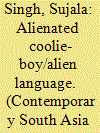

|
|
|
|
|
| Publication |
2012.
|
| Summary/Abstract |
The primary focus of this essay is on the representation of child labour in Mulk Raj Anand's Coolie (1936). I argue that the young-ness of Munoo, the coolie-boy is significant for understanding Anand's social critique of the colonial-capitalist machinery and its reliance upon the sub-waged labour of children and adolescents. It is limiting to read the novel as merely a social critique, however, as it also opens up crucial debates on what it means for an Indian writer writing in English to represent a young ostracised citizen-subject who can hear English and mimic its sounds without having access to an English education. Anand's use of an adolescent is thus significant as an early attempt at foregrounding regional disenfranchisement in English. Through the tropes of listening, seeing, and smelling, and Anand's selective translations and transliterations, I show why Munoo's adolescence matters: it provides a social commentary as well as enabling Anand to highlight the conundrum of representing Munoo's semi-literate, non-English subjectivity into the English language.
|
|
|
|
|
|
|
|
|
|
|
|
|
|
|
|
| 2 |
ID:
117771
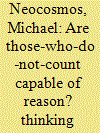

|
|
|
|
|
| Publication |
2012.
|
| Summary/Abstract |
This article is concerned to show that the historical science of the (neo-)colonial world is unable to allow for an analysis of the political subjectivities of 'those-who-do-not-count' or 'subalterns' as rational beings. Rather, it can only think such subjectivities as the products of people who are merely bearers of their social location, not thinking subjects. As a result, such history can only be a history of place, not a history of the transcending of place; it therefore amounts to colonial or state history. Historical objectivity invariably produces state history. The thought of the possibility of emancipatory politics, which always exceeds place, is thus precluded. This is an unavoidable epistemic problem in history and the social sciences in their current form. Following the work of Lazarus, I argue for an alternative historical methodology in Africa in terms of an internal analysis of the idioms of politics as discontinuous subjective sequences.
|
|
|
|
|
|
|
|
|
|
|
|
|
|
|
|
| 3 |
ID:
137264
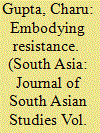

|
|
|
|
|
| Summary/Abstract |
Extending the paradigms of Subaltern Studies, this paper takes up three disparate sites—didactic Hindi literature, conversions and army discourses—to provide a perspective on the disjunctive forms of representation that signified Dalit bodies in colonial north India. Through different arenas, it shows how representations constituted, and were reflective of, the power relationships between upper and lower castes, in which the former reinstated their dominance. At the same time, the paper challenges straightjacketed links between representation and domination by expanding its archival arenas, and argues that Dalit bodies were not just screens on which high castes and colonial authorities projected their own caste, racial and gender anxieties. Rather, Dalits too represented themselves in different ways, conceiving a gendered sense of self in social, religious, public and political spaces. Such contested practices of representations produced creaks and dislocations in dominant embodiments.
|
|
|
|
|
|
|
|
|
|
|
|
|
|
|
|
| 4 |
ID:
117873
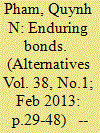

|
|
|
|
|
| Publication |
2013.
|
| Summary/Abstract |
This essay questions assumptions about agency expressed in prevailing concepts of freedom understood as autonomy. It also turns to contexts of bondedness, where one endures and negotiates one's embeddedness in relations of power and thick webs of sociality, to explore alternative modes of agency, of response-ability. The theoretical analysis engages two sites of communal agency, particularly women's: first, I draw from Saba Mahmood's study of the women's mosque movement in contemporary Egypt; and second, I look closely at H? Xuân Huong folk poetry in eighteenth-century Confucian-dominated Vi?t Nam. One can be conceived as a politics of piety, whereas the other can be aptly called a politics of impiety. Both offer glimpses into alternative ways of being and acting in the world. Together they challenge the prevalence of a freedom-centered approach in international relations and political theory.
|
|
|
|
|
|
|
|
|
|
|
|
|
|
|
|
| 5 |
ID:
178109


|
|
|
|
|
| Summary/Abstract |
The archive is used both literally and metaphorically as a manifestation of the ubiquity of power and the authority invested in material archives. To work from the margin and in secrecy is a trait of the subaltern quest of both Wadood the bookseller and Dr Nameer, as well as the different characters of the De Molina family. The official history written by the powers that be marginalizes the other. However, the digging of the archives by the subaltern raises the hope of an alternative history that saves the traces of the subaltern. The archive includes physical archives, manuscripts, artefacts, stamps, cassettes, and photos, as amply shown in Fihris. In Ḥiṣn al-turāb, the archive has more of a metaphoric than literal meaning: it is the spectral topos of suppressed desire and recovered memory. The archive enables the subaltern to speak by digging up and even making up archives. Both quests are feverish and reflect the trauma that motivates digging up the past as recovered memory and the desire to keep traces of the past as tokens of a marginalized identity seeking redress. Archives are tokens of the past that threaten the integrity of the history written by the powerful: the hunter. The victims question that history and create nuisance that offers hope of a more just history that includes the marginalized subalterns.
|
|
|
|
|
|
|
|
|
|
|
|
|
|
|
|
| 6 |
ID:
101829
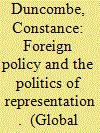

|
|
|
|
|
| Publication |
2011.
|
| Summary/Abstract |
The patterns of representation that position the West as the dominant enlightened Self to the non-West's subordinate Other are evident in Hollywood filmmaking. Films such as A Mighty Heart, The Kingdom and The Siege continue to maintain the Hegelian Master/Slave dialectic of West/non-West, which becomes part of the narrative of the West's identity construction. In delving into this supposed relationship between West and non-West, it appears as though few scholars have considered how the processes of representation feed into this essentialised dialectic. In delving into the area of representation, a space for understanding emerges in relation to determining whether or how much being represented in certain ways affects or acts to manipulate the behaviour and choices of the Other, especially in terms of foreign policy conduct. This article examines representational dynamics in terms of the position of the Other as Self, in order to offer an authoritative conception of how schemas of representation influence the direction of foreign policy.
|
|
|
|
|
|
|
|
|
|
|
|
|
|
|
|
| 7 |
ID:
144273
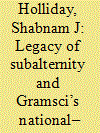

|
|
|
|
|
| Summary/Abstract |
Drawing on Laclau’s concept of populist discourse and Gramsci’s ‘national–popular collective will’, and using the case of Iran, this article puts forward the idea of the legacy of subalternity in the context of post-revolution governments. The concept of ‘national–popular collective will’ facilitates an understanding of how the popular subject is constructed and the meanings embedded in that process. It is argued that Islamic Republic elites articulate a populist discourse that constructs the ‘self’ (the Islamic Republic) as synonymous with ‘the people’. Embedded in this discursive construction is a legacy of subalternity that goes back to the 1979 Revolution’s populist discourse.
|
|
|
|
|
|
|
|
|
|
|
|
|
|
|
|
| 8 |
ID:
159382
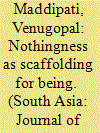

|
|
|
|
|
| Summary/Abstract |
This essay attempts to open up a conversation between M.K. Gandhi and contemporary ecological thought. Unlike ecologists, who think through the human and then reach for a wider post-human ecology, in the 1930s, Gandhi journeyed in the reverse order, arriving at an emphasis on human withdrawal into nothingness after initially thinking through the withdrawal into nothingness of an infinitely extended, non-human, celestial being. The essay explores Gandhi's emerging anthropocentric conception of the piety of nothingness in the context of a household plan designed for him in 1936–37 by Madeline Slade, in the village of Segaon in Maharashtra. The essay draws out the architectural and political entailments of Gandhi's anthropocentrism and his emphasis on varnashramadharma.
|
|
|
|
|
|
|
|
|
|
|
|
|
|
|
|
| 9 |
ID:
170471
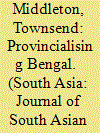

|
|
|
|
|
| Summary/Abstract |
Written against the backdrop of Darjeeling’s 2017 Gorkhaland agitation, this essay chronicles the colonialisations—first British, now Bengali—that undergird this subnationalist struggle. The analysis challenges romanticised views of Darjeeling, presenting instead a case study of internal colonialism. As an exercise in post-colonial thought, it leverages the view from Darjeeling to explore a notable lacuna in our reckonings of subalternity. A place long thought to be ‘above it all’ here begs its own history from below. Heeding Gorkhaland’s call, the essay proposes ‘provincialising Bengal’ as a means to productively address the internal colonialism at hand, and therein rethink Bengal and its peripheries.
|
|
|
|
|
|
|
|
|
|
|
|
|
|
|
|
| 10 |
ID:
114597
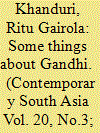

|
|
|
|
|
| Publication |
2012.
|
| Summary/Abstract |
This article focuses on Gandhi's things as a point of intersection - a contact zone of divine and market logics, sensory reality, and subaltern and elite routes of access. Gandhi memorials, his autograph, his ashes, an auction, and the special Gandhi edition Montblanc luxury pen evoke the magic that embraces ordinary things, rendering them extraordinary and desirable. Drawing upon episodes from historical and contemporary contexts, this article prolongs the moment of wonder at why Gandhi continues to cast a spell on a culture industry that transcends national, subaltern, and elite boundaries.
|
|
|
|
|
|
|
|
|
|
|
|
|
|
|
|
| 11 |
ID:
192989
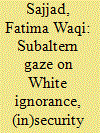

|
|
|
|
|
| Summary/Abstract |
In this article, I, as a subaltern, offer a reverse gaze on White security plans to rescue the world from the tide of violent extremism. Violent extremism has been identified as a global security threat by the United Nations, which announced a Plan of Action to combat the threat in 2016. Education has been considered a valuable tool for preventing violent extremism. In 2017, UNESCO published a policy guide explaining how education can be used to prevent violent extremism. This article offers a critique of the UNESCO policy guide, using the construct of White ignorance as explained by Charles Mills and Jennifer Mueller’s Theory of Racial Ignorance. This critique, coming from a location (Pakistan) where education has been under intense White scrutiny since 9/11, owing to its alleged link with violent ideologies, provides an inverse perspective on the problem of violent extremism. Using Mills’s concept of the epistemology of ignorance, I argue that international security policies view security as maintenance of White hegemony and refuse to listen to the people labelled as a security problem by White epistemic authorities. I contend that it is the White security policy that needs to be educated to prevent violence and maintain durable security.
|
|
|
|
|
|
|
|
|
|
|
|
|
|
|
|
| 12 |
ID:
151216
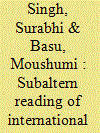

|
|
|
|
|
| Summary/Abstract |
The article draws on Bourdieu’s notion of orthodoxy and doxa , whereby a particular view of the world becomes established as a normal, natural and unquestioned truth, as the entry point for the discussion on international organisations and issues of order, disorder and marginality. Every established order, according to Bourdieu, tends to produce very different degrees and with very different means, the naturalisation of its own arbitrariness, whereby it successfully manages to make the world conform to the myth of it being a self-evident and natural order. Such a project as the article argues, given the very constitution of international society is highly problematic, especially from the standpoint of those traditionally located at the very margins of decision making—the subalterns. In deconstructing the meaning and substance of ‘order’ through select case studies, the article seeks to explicitly focus on international organisations as sites of power and control, the processes of institutionalisation and socialisation and the possibilities of change that posit new ways of thinking about issues of order and disorder in international relations.
|
|
|
|
|
|
|
|
|
|
|
|
|
|
|
|
| 13 |
ID:
104030
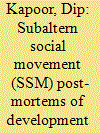

|
|
|
|
|
| Publication |
2011.
|
| Summary/Abstract |
This paper expounds on an Adivasi-Dalit subalternist critique of development and compulsory modernization drawn from a participatory critical-interpretive case study developed from several episodic engagements with these groups between 2006 and 2009 in Orissa, India. This critique is advanced by the Lok Adhikar Manch (LAM), a trans-local movement network of 13 subaltern social movement groups in Orissa. These disclosures are then deployed in a critical conversation with a specific strain of Marxist scholarship in peasant studies that dismisses subaltern movements as conservative (status-quo politics in relation to capital) and as scattered anti-Marxist postmodern populisms that fail to challenge the reproduction of capitalist control of the rural hinterlands.
|
|
|
|
|
|
|
|
|
|
|
|
|
|
|
|
| 14 |
ID:
139463
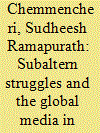

|
|
|
|
|
| Summary/Abstract |
This paper analyses the interactions between subaltern struggles and the global media, with special reference to the ways in which subalterns find opportunities in the media to make their voices heard. The paper argues that rather than losing their state of subalternity in the process of gaining a voice through media exposure, media representation reinforces the subaltern identity of the marginalised. Scrutinising the politics of representation in the media representation of the Koodankulam anti-nuclear protests and the Kashmir conflict in India, this essay draws on insights from post-colonial studies to explore new ways to read the work of the global media in their coverage of the subaltern.
|
|
|
|
|
|
|
|
|
|
|
|
|
|
|
|
| 15 |
ID:
137258
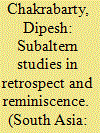

|
|
|
|
|
| Summary/Abstract |
This essay aims to provide a context for the intellectual project of ‘subaltern history’ and the associated series, Subaltern Studies, by undertaking a retrospective description and evaluation of the project and by drawing on the history of Dipesh Chakrabarty's personal involvement in it. It also attempts to outline some of the limitations of the original conception of the project as well as highlight some of its more enduring legacies.
|
|
|
|
|
|
|
|
|
|
|
|
|
|
|
|
| 16 |
ID:
151223
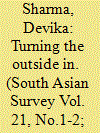

|
|
|
|
|
| Summary/Abstract |
Challenging the inside–outside dichotomy in international relations (IR) allows us to recognise and give voice to histories, positions, reflections, processes and actors that were invisible, marginalised or considered beyond the purview of the discipline. ‘Turning the outside in’ is not only about disrupting the long-held disciplinary boundaries but also about bringing into the mainstream that which had been overlooked or seen as epiphenomenal because of the centrality of the inside–outside dichotomy. Given the vantage point that ‘outside’ histories, ideas and worldviews provide, India and other postcolonial countries are well ‘placed’ to take advantage of looking ‘in’ and hence blurring the boundaries between inside and outside. However, it is important to underline the fact that, although multiple voices and perspectives need to be heard, they must do so free of the very frames and dichotomised approaches that signified knowledge building and dissemination for the better part of IR’s evolution as a discipline.
|
|
|
|
|
|
|
|
|
|
|
|
|
|
|
|
| 17 |
ID:
190820
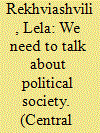

|
|
|
|
|
| Summary/Abstract |
This article points out the need to talk about the political society, or the politics and resistances, of subaltern groups in Eastern Europe and Eurasia. Existing literature frames diversity marginalized struggles as civil society struggles or decries the weakness of donor-driven, disembedded civil societies, reproducing the understanding of political life in the region in terms of absences, voids and deficiencies. Challenging this subsumption or dismissal of subaltern struggles, I advance two arguments. First, I argue against broadening the civil society concept to include various subaltern struggles as this approach risks overwriting differences between those groups that mobilize as rights-bearing citizens and the ones that are not recognized or treated as civil society. Instead, I propose acknowledging the historically and spatially contingent character of civil society and the defining role of the state and other actors in shaping which struggles fall within or beyond institutional and discursive frameworks of legality and legitimacy. Second, I argue that Patra Chatterjee’s concept of ‘political society’ can serve better as a meta-vocabulary to account for a diversity of struggles shunted as backwards, premodern and uncivilized, and to refocus research from what is absent to what is present, towards understanding counter-hegemonic discourses and practices.
|
|
|
|
|
|
|
|
|
|
|
|
|
|
|
|
| 18 |
ID:
117772


|
|
|
|
|
| Publication |
2012.
|
| Summary/Abstract |
If, as Spinoza suggests, sadness is an inadequate idea, how do we account for its mobilization in nationalist and post-colonial critiques of colonialism, neo-colonialism and neo-liberalism? How, in other words, might we see in the inadequate idea of sadness the very conditions for thinking our way into a discussion of political subjectivity that loosens the grip of biopolitics on African subjectivity? Drawing on aesthetic practices of art and film, this article argues that a fundamental shift is discernable in the careful ways in which the affect of sadness has been worked over by artists and filmmakers in Africa. This is a site of productive reworking, which not only eclipses the exhausted political sphere in Africa, but offers ways to theorize its reconstitution. To this end, the article asks that we attend to the ways in which potentiality and impotentiality are rendered as central premises for tackling the question of the renewal of political subjectivity in Africa.
|
|
|
|
|
|
|
|
|
|
|
|
|
|
|
|
|
|
|
|
|